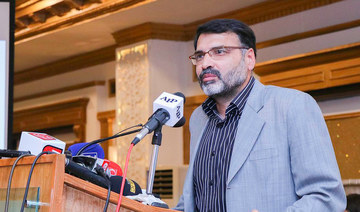ISLAMABAD: International media watchdog Reporters Without Borders (RSF) and several other media defenders have called on political parties in Pakistan to commit to press freedom in the run-up to general elections, likely in January 2024.
Pakistan is one of the most dangerous places in the world to be a journalist. According to the Freedom Network’s Annual Impunity 2022 Report, there were no convictions in 96 percent of journalist killings in the past 10 years in Pakistan.
“As Pakistan is about to hold general elections and political parties draft new election manifestos ... Reporters Without Borders (RSF) and the country’s leading press clubs, national and provincial unions of journalists, and RSF’s Pakistan partner Freedom Network call on mainstream and provincial heads of contesting parties to pen their commitment to defending freedom of expression and protection of journalists in their party manifestos,” RSF said in a statement posted on its website this week.
“In the run-up to elections, the ball is now in the court of the political parties as regards defending press freedom, as well as journalistic independence and pluralism, as fundamental guarantees of a functioning democracy.”
RSF and the other media defenders called on political parties to make a concrete commitment to their proposals, starting with the search for legislative guarantees for the protection of journalists and the fight against impunity for crimes of violence against them.
Earlier this year, journalist Arshad Sharif, a known critic of the former Shahbaz Sharif-led coalition government and the all-powerful, went on the run and was killed in Kenya under mysterious circumstances. This week, Pakistani anchorperson and YouTuber Imran Riaz Khan returned home four months after he went missing following his arrest from Sialkot airport.
“As the situation of journalists in Pakistan worsens in the run-up to the general elections, Reporters Without Borders (RSF) and several defenders of journalism are launching a crucial appeal to the Pakistani political parties,” RSF said.
Elections in the troubled South Asian nation, initially scheduled for November, were postponed due to constituency redrawing through a new census. The election authority announced last week the vote will now take place in late January, following procedures such as nomination filings, appeals, and campaigning.
Pakistan is currently under a caretaker government led by interim Prime Minister Anwaar-ul-Haq Kakar, tasked with supervising upcoming elections. However, concerns have arisen over the government’s impartiality, as Kakar belongs to a pro-military party, and it seems to align with opponents of the imprisoned ex-PM Imran Khan.
As it stands, Khan, the primary opposition leader, is ineligible to participate in this election due to a five-year public office ban resulting from a corruption inquiry.


















